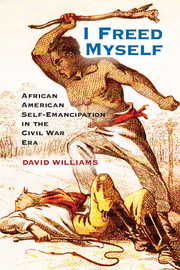1 - “Yes, We All Shall Be Free”
Pressing the Nation Toward Freedom
Published online by Cambridge University Press: 05 July 2014
Summary
“I can just barely remember my mother.” That was what Tom Robinson, born into slavery on a North Carolina plantation, told an interviewer for the 1930s Federal Writers Project. He was only ten when sold away from his mother shortly before the Civil War began.
But I do remember how she used to take us children and kneel down in front of the fireplace and pray. She’d pray that the time would come when everybody could worship the Lord under their own vine and fig tree – all of them free. It’s come to me lots of times since. There she was a’praying, and on other plantations women was a’praying. All over the country the same prayer was being prayed.
Secession and war served only to make such prayers more expectant and intense. Despite efforts to conceal the war’s implications from them, slaves had many ways of learning about what its outcome could mean for them. Years after the war, Hattie Nettles of Opelika, Alabama, remembered climbing a fence as a young girl to watch Confederate soldiers pass by. She did not know where they were going at first, but it was not long before she found out. Mary Gladdy, a Georgia freedwoman, recalled “the whisperings among the slaves – their talking of the possibility of freedom.”
Throughout the war, slaves met in secret to hold prayer meetings for freedom. According to Mary Gladdy, those on her plantation gathered in their cabins two or three nights a week. They placed large pots against the doors to keep their voices muffled. “Then,” she said, “the slaves would sing, pray, and relate experiences all night long. Their great, soul-hungering desire was freedom.” Those few slaves who could read kept up with events through pilfered newspapers and spread the word to their neighbors. Young Ella Hawkins of Georgia heard the older slaves whispering among themselves, “Us is gonna be free! Jes as sho’s anything. God has heard our prayers; us is gonna be free!” When a white minister preached that slavery was ordained by God and prayed aloud for Him to drive the Yankees back, Georgia slave Ella Hawkins prayed silently to herself, “Oh, Lord, please send the Yankees on.”
- Type
- Chapter
- Information
- I Freed MyselfAfrican American Self-Emancipation in the Civil War Era, pp. 18 - 63Publisher: Cambridge University PressPrint publication year: 2014



